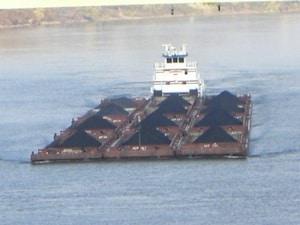The coal industry in the United States has found a way to increase their profits, while at the same time avoiding the cumbersome environmental standards in place to protect American citizens from coal emissions – they can just ship their filthy products overseas where regulations are scarce. As coal consumption in the U.S. has fallen in recent years, the dirty energy industry has hardly noticed, thanks to the increased demand from foreign buyers.
While the fact that the U.S. is burning less and less coal is a good thing, shipping the excess coal to foreign countries could more than negate the emissions reductions in the U.S. As Ezra Klein from The Washington Post points out:
The U.S. is burning less and less coal each year, thanks to cheap natural gas and new pollution rules. From a climate perspective, that’s a huge deal — less coal means less carbon. But here’s the catch: if the U.S. just exports its unused coal abroad, the end result could actually be more carbon…
So here’s one possible future: If we’re not going to burn our coal, someone else will. One Tokyo shipping company, Daiichi Chuo Kisen Kaisha, says that U.S. coal exports could double in the next three or four years. In Washington state, coal companies are proposing two large export terminals that would help ship tens of millions of tons of coal from the Powder River Basin to countries like China. That, in turn, could make coal even cheaper in places like China — which might spur the country to build even more coal power plants than its current, already hectic pace. And, since carbon-dioxide heats up the planet no matter where it’s burned, this outcome could cancel out many of the global-warming benefits of the U.S. coal decline. (emphasis added.)
The United States has some controls in place that help reduce the amount of emissions coming from coal burning power plants. Foreign countries who are hungry for energy typically do not have the same standards in place – they are far more lax – meaning that more carbon escapes into the atmosphere, not to mention the health impacts from power plant pollution that can travel across oceans. So while we might temporarily be breathing easier in the U.S., those emissions from China and elsewhere will soon accumulate in the atmosphere, posing a danger to all of us.
Already, American coal companies are actively working to open up new shipping ports in the Pacific Northwest so that they have a more direct route to ship coal to Asia. Their goal is to be able to increase exports from a few million tons of coal today to as much as 130 million tons of coal exports in the near future.
And opening up these new ports also opens up areas of the U.S. to increased health risks from the transportation of coal. Just because it gets burned in other countries doesn’t mean that the U.S. is worry free in this scenario. In fact, oftentimes the transportation of coal is almost as dangerous as the burning of coal.
Grist notes that 45% of all railway traffic in America is for the transportation of coal. Accounting for almost half of their income, the railway industry is also pushing for increased coal production and exports. But the problem is that coal transportation just isn’t safe. Coal is frequently transported in open cars, or generously ventilated cars, allowing tons of coal dust to spread along their path. This coal dust not only poses a threat to human health, but it also poses a huge threat to other trains, as coal dust buildup on railway lines has been linked to several train derailments in the United States.
Studies have shown that each individual coal transport car can release a ton of coal dust during transport, while other studies say that a typical coal train releases about 3% of its payload – roughly 100 tons – of coal during each transport.
When you drill down to the heart of it, there’s no way to make coal safe or clean. It is dangerous to extract, dangerous to transport, dangerous to burn, and it poses a threat to our health after it is burned. Exporting the problem won’t make it go away.
Photo credit – MoToMo via Flickr
Subscribe to our newsletter
Stay up to date with DeSmog news and alerts







